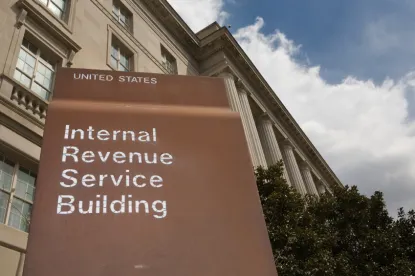The IRS notice further eases, but does not delay, FATCA implementation.
On May 2, the Internal Revenue Service (IRS) published Notice 2014-33 (the Notice),[1] which announced that calendar years 2014 and 2015 will be regarded as a “transition period” for purposes of IRS enforcement and administration of the due diligence, reporting, and withholding provisions under the Foreign Account Tax Compliance Act (FATCA).[2] The Notice also announced extended deadlines for implementing certain onboarding and due diligence procedures as well as certain relief relating to “limited foreign financial institutions” and “limited branches.” Finally, the Notice also announced minor amendments to the Treasury regulations relating to certain due diligence standards and procedures to be applied by withholding agents.[3]
Transition Period Relief
In the Notice, the IRS states that it “will take into account” the extent to which certain stakeholders (such as foreign financial institutions [FFIs] and withholding agents) have made “good faith efforts” to comply with their obligations under the Treasury regulations relating to FATCA. Entities that cannot demonstrate that they have made good faith efforts will not be entitled to relief from IRS enforcement during the transition period. It is unclear what relief the IRS will provide or what the IRS will consider to be good faith efforts.[4] Entities that have not made good faith efforts to comply will be subject to full enforcement (e.g., any penalties and other restrictions) during the transition period.
The Notice does not specify what relief will be available to an entity that has shown good faith efforts to comply with FATCA, but it does provide two examples of situations in which the IRS will account for good faith efforts. In the first example, the IRS will take into account whether a withholding agent has made “reasonable” efforts during the transition period to modify its account-opening practices and procedures to document the FATCA status of payees and to apply certain rules regarding payee FATCA status determination.
In the second example, the IRS will consider the extent to which a participating FFI, registered deemed-compliant FFI, or limited FFI has undertaken good faith efforts to identify and facilitate the registration of each other member of its expanded affiliated group. This latter example deals with the general “all or nothing” rule in the Treasury regulations, which provides that, in order for a member of an “expanded affiliated group” to obtain the status of “participating FFI” or “registered deemed-compliant FFI,” each other member of the group must also be a participating FFI, registered deemed-compliant FFI, exempt beneficial owner, or “limited FFI/branch.” Presumably, in that situation the IRS would permit a group member to obtain FATCA-compliant status as long as a good faith effort has been made to identify and, if necessary, fulfill any registration requirement to obtain compliant status for other group members.
Scope of “Preexisting Obligations” Treatment Expanded
Under current Treasury regulations, new account-opening procedures are required to be implemented as early as July 1, 2014 (and potentially later, in the case of accounts maintained by participating FFIs and registered-deemed-compliant FFIs), and obligations5] entered into prior to such time are treated as “preexisting obligations.” Current Treasury regulations contain transitional rules requiring that payees of such preexisting obligations be documented prior to July 1, 2016 to determine if the payee is subject to FATCA withholding (or earlier, if the payee is a “prima facie FFI”).
The Notice announces that the Treasury regulations will be amended to provide that obligations held by entities that are executed on or after July 1, 2014 and before January 1, 2015 will be treated as preexisting obligations for purposes of the due diligence and withholding requirements, thus expanding the scope of obligations that are subject to the extended timeline for due diligence and withholding described above. The Treasury expects to make corresponding changes to each model of intergovernmental agreement (IGA) so that FFIs in jurisdictions with an effective IGA with the United States can apply such due diligence standards to entity-held obligations. The change described above applies only to entity-held obligations so that obligations entered into on or after July 1, 2014 by individuals will not be considered preexisting obligations.
Flexibility for Limited Entities and Their Groups
Acknowledging the concerns regarding certain financial institutions’ inability to comply with FATCA because of legal requirements in their respective home jurisdictions (known as “limited FFIs” and “limited branches”), the Notice announced relief measures applicable to such financial institutions.
Under the “all or nothing” rule mentioned earlier, an expanded affiliated group may have one or more members located in a jurisdiction with laws that prevent the member from complying with FATCA. To allow an expanded affiliated group to meet the all or nothing rule, Treasury regulations allow such group members to be treated as a “limited FFI” or “limited branch” so that the mere fact that a group member is prevented from complying with FATCA because of local law does not prevent the group from satisfying the all or nothing rule.
To qualify as a limited FFI or branch, an entity is subject to various conditions relating to registration and account opening. Under current Treasury regulations, limited FFIs and branches are restricted from opening accounts that they must treat as “U.S. accounts” or as accounts held by a “nonparticipating FFI.” The Notice announces proposed amendments to the Treasury regulations to permit a limited FFI or branch to open a U.S. account for persons and nonparticipating FFIs resident in the same jurisdiction where the limited FFI or branch is located. The limited FFI will still be restricted from soliciting U.S. accounts from persons not resident in, or accounts held by nonparticipating FFIs not established in, the same jurisdiction as the limited FFI or branch. In addition, the limited FFI or branch cannot be used by another group member to circumvent the group member’s obligations under FATCA.
The Notice proposed additional relief for limited FFIs and branches in connection with their registration obligations. Noting that certain jurisdictions prohibit an FFI located in those jurisdictions from registering with the IRS (even to obtain status as a limited FFI), the Notice provides that the Treasury regulations will be revised so that, if an FFI is prohibited from registering under local law as a limited FFI, the prohibition will not prevent other members of the expanded affiliated group from obtaining compliant status under FATCA, so long as the FFI that is subject to local law restrictions is identified as a limited FFI (and information is provided regarding such limited FFI) on the registration of another group member.
Conclusion
Although light on details, the Notice provides some comfort to market participants that minor foot faults in FATCA compliance during 2014 and 2015 will not necessarily have negative consequences. However, it is important to note that the guidance provided in the Notice does not delay FATCA implementation. Financial institutions and other affected participants should proceed with their planned FATCA compliance efforts and should not rely on the possibility that the IRS will not impose penalties or other sanctions because of noncompliance.
[1]. View the Notice here.
[2]. For an overview of FATCA, see our July 15, 2013 LawFlash, “Treasury Revises FATCA Implementation Timeline,” available here. For a brief discussion of upcoming FATCA-related deadlines, see our April 10, 2014 LawFlash, “Initial FATCA Registration/Withholding Dates Draw Near,” available here.
For a discussion of FATCA prior to the promulgation of the final FATCA regulations, see our October 26, 2012 LawFlash, “Revisions to FATCA Implementation,” available here; our March 5, 2012 LawFlash, “FATCA Proposed Regulations Unveiled by Treasury,” available here; and our August 26, 2011 LawFlash, “Recent IRS Notices Provide Supplemental FATCA Guidance and Phased-in Implementation,” available here.
[3]. In particular, such amendments will revise the applicability of certain standards of knowledge regarding the reliability of documentation for account holders treated as documented prior to July 1, 2014. The Notice also announces changes regarding the form of reasonable explanation to be provided by an individual account holder as to the holder’s non-U.S. status, notwithstanding certain U.S. indicia relating to the account holder.
[4]. Treasury regulations currently contain rules regarding good faith in the context of the reasonable cause exception to tax penalties arising from underpayments of tax as well as under rules applicable to “gain recognition agreements” under section 367 of the Internal Revenue Code. In brief, the latter defines “good faith” as a showing that the taxpayer made a substantial effort to comply, has implemented procedures to prevent future mistakes, and has taken corrective action as soon as mistakes were identified. However, the Notice does not specify whether the IRS intends to apply those same rules in the context of FATCA compliance.
[5]. For this purpose, an “obligation” generally includes financial accounts, contracts, debt, or equity interests.







 />i
/>i
